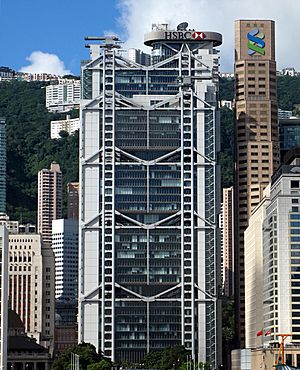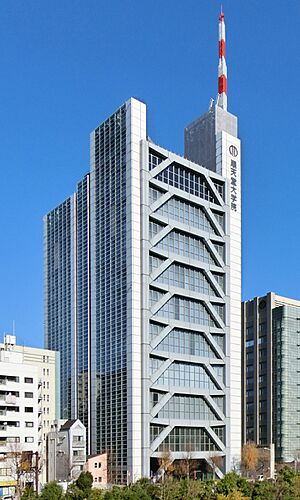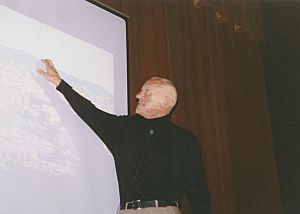Norman Foster facts for kids
Quick facts for kids
The Lord Foster of Thames Bank
|
|
|---|---|
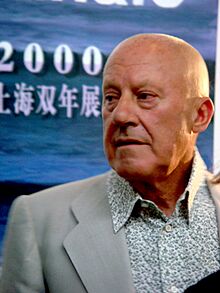
Lord Foster in 2008
|
|
| Born |
Norman Robert Foster
1 June 1935 Reddish, Stockport, England
|
| Alma mater | University of Manchester Yale University |
| Occupation | Architect |
| Spouse(s) |
Begum Sabiha Rumani Malik
(m. 1991; div. 1995)Elena Fernández-Ferreiro López de Ochoa
(m. 1996) |
| Children | 5 |
| Awards |
|
| Practice | Foster + Partners |
| Buildings |
|
| Projects | American Air Museum at the Imperial War Museum Duxford |
Norman Robert Foster, Baron Foster of Thames Bank (born 1 June 1935) is a famous English architect. He is known for his modern and high-tech building designs. His company, Foster + Partners, is one of the biggest in the United Kingdom. It works on projects all over the world.
Norman Foster also leads the Norman Foster Foundation. This foundation helps new architects and designers think creatively. It encourages them to imagine and build for the future. The foundation opened in June 2017 in Madrid, Spain. Foster received the Pritzker Prize in 2000, which is a very important award in architecture.
Contents
Early Life and Education
Where Norman Foster Grew Up
Norman Robert Foster was born in 1935 in Reddish, England. This area is near Stockport. He was the only child of Robert and Lilian Foster. His family later moved to Levenshulme, a suburb of Manchester. They lived in a simple way.
His father worked as a machine painter. This job inspired Norman to learn about engineering and design. His mother worked in a local bakery. Norman felt his parents were very hardworking.
School Days and First Jobs
Foster went to Burnage Grammar School for Boys. He was a quiet student and enjoyed reading. At 16, he left school. He passed an exam to join a trainee program at Manchester Town Hall. This was his first job as an office junior.
In 1953, Foster joined the Royal Air Force for his national service. He chose the air force because he loved aircraft. After his service, he looked for other jobs. He worked as an assistant at an architecture firm. The staff there encouraged him to become an architect.
Studying Architecture
In 1956, Foster began studying at the Manchester School of Architecture. He worked part-time to pay for his studies. He sold ice cream, worked as a bouncer, and made crumpets at a bakery. He also spent a lot of time studying at the local library.
His hard work paid off. In 1959, he won an award for a detailed drawing of a windmill. After graduating in 1961, he won a special scholarship. This allowed him to study at the Yale School of Architecture in the United States. There, he met Richard Rogers, who would become his future business partner. They traveled across America together to study different buildings.
Norman Foster's Career in Architecture
Starting His Own Firms
In 1963, Foster returned to the UK. He started an architecture firm called Team 4. He worked with Richard Rogers and sisters Georgie and Wendy Cheesman. One of their first projects was a unique glass building in Cornwall.
After Team 4 split up in 1967, Norman and Wendy started a new company. They called it Foster Associates. From 1968 to 1983, Foster worked with American architect Richard Buckminster Fuller. They focused on designing buildings that were good for the environment.
Key Projects in the 1970s and 1980s
Foster Associates first focused on industrial buildings. In 1969, they designed an office and leisure center for Fred. Olsen Lines. This building brought workers and managers together in the same space. In 1970, they built the world's first inflatable office building.
A major project in England was the Willis Faber & Dumas headquarters in Ipswich. It was finished in 1975. The client wanted a friendly workplace. Foster designed open-plan offices, a roof garden, a swimming pool, and a gym. The building has a glass front that changes from dark to glowing as the sun sets. This building is now a protected historical site.
The Sainsbury Centre for Visual Arts was another important public building. It opened in 1978 at the University of East Anglia. This art gallery was one of Foster's first big public designs.
In 1981, Foster designed a new terminal for London's Stansted Airport. This building is a great example of high-tech architecture. It opened in 1991 and won an award. Foster also worked with artist Brian Clarke on ideas for stained glass in the terminal.
Foster became known for designing office buildings. In the 1980s, he designed the HSBC Main Building in Hong Kong. At the time, it was the most expensive building ever built. It has lots of natural light, giving workers views of Victoria Peak or Victoria Harbour.
Designs from the 1990s to Today
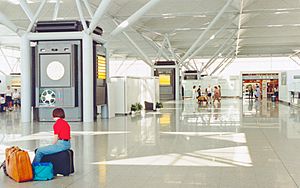
In the 1990s, Foster + Partners proposed a very tall skyscraper for London. It was called the London Millennium Tower. But it was considered too tall for the city's skyline. Instead, Foster designed 30 St Mary Axe, which people call "the Gherkin" because of its shape. This building uses smart computer systems with basic physics, like how air moves. In 1999, the company changed its name to Foster + Partners.
In 2004, Foster designed the Millau Viaduct in Southern France. This is one of the tallest bridges in the world. The mayor of Millau said Foster gave them "a model of art."
Foster worked with Steve Jobs, the co-founder of Apple, to design Apple Park. This is Apple's main office in Cupertino, California. The circular building opened to employees in April 2017.
In 2007, Foster worked with Philippe Starck and Sir Richard Branson on plans for Virgin Galactic. This project aims to make space travel possible for tourists. Foster believes it is important to attract young talent. He is proud that the average age of people working at Foster + Partners is young.
In May 2022, it was announced that Foster would help plan the rebuilding of Ukraine. This work would happen after the end of the 2022 Russian invasion of Ukraine. By 2024, Foster + Partners earned a lot of money from their projects. A large part of their income came from clients in the Middle East.
Personal Life and Achievements
Family Life
Norman Foster has been married three times. His first wife, Wendy Cheesman, passed away in 1989. He was married to Begum Sabiha Rumani Malik from 1991 to 1995. In 1996, he married Elena Ochoa, a Spanish psychologist. He has five children.
Health Challenges
In the 2000s, Foster faced serious health issues. He was diagnosed with cancer but made a full recovery after treatment. He also experienced a heart attack.
Awards and Recognition
Foster has received many honors for his work. He was made a Knight in 1990, which gave him the title "Sir." In 1997, he was appointed to the Order of Merit (OM). This is a very special honor given by the British monarch. In 1999, he became a Baron, which means he is a member of the peerage. His full title is Baron Foster of Thames Bank.
He became a member of the Royal Academician (RA) in 1991. In 1995, he was made an Honorary Fellow of the Royal Academy of Engineering. In 2017, he received the Freedom of the City of London. In 2018, the Bloomberg London building, which he designed, won a Stirling Prize.
In 2007, he received the Lynn S. Beedle Lifetime Achievement Award. This award recognized his important work on tall buildings. He also received the Aga Khan Award for Architecture for the University of Technology Petronas in Malaysia. In 2009, he won the Prince of Asturias Award for Arts. In 2017, he received the Golden Plate Award from the American Academy of Achievement.
In 2012, Norman Foster was chosen by artist Sir Peter Blake to appear in a new version of the famous Beatles album cover, Sgt. Pepper's Lonely Hearts Club Band. This honored him as one of Britain's important cultural figures.
Famous Buildings by Norman Foster
- Canary Wharf tube station in London
- The Gherkin (30 St Mary Axe) in London
- Reichstag Dome in Berlin, Germany
- Great Court of the British Museum in London
- Hearst Tower in New York, USA
- Millennium Bridge in London
- HSBC Main Building in Hong Kong
- British Library of Political and Economic Science at the London School of Economics
- Chesa Futura in St. Moritz, Switzerland
- Carré d'Art in Nîmes, France
- Bilbao metro in Spain
- McLaren Technology Centre, in Woking, England
- Apple Park at Cupertino, California, USA
Images for kids
See also
 In Spanish: Norman Foster para niños
In Spanish: Norman Foster para niños
 | Precious Adams |
 | Lauren Anderson |
 | Janet Collins |


